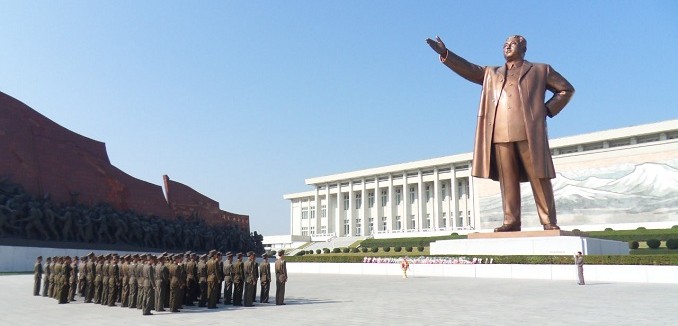There is a converging consensus among U.S. officials and independent experts to the effect that Iran was deeply involved in North Korea’s February nuclear test — the country’s third — and that the bomb might even be considered an “Iranian bomb.”
Experts interviewed by the Washington Post cite extensive and unusual steps taken by Pyongyang to shield the composition of the bomb from detection, the suspicion being that North Korea sought to prevent observers from detecting that the bomb was uranium-based rather than plutonium-based. North Korea’s previous two nuclear explosions have been of plutonium bombs, and the country is not known to possess a so-called uranium pathway. Iran, in contrast, is known to possess a uranium pathway but not a plutonium pathway:
At least two separate analyses of the Feb. 12 detonation confirmed that the effects of the blast were remarkably well contained, with few radioactive traces escaping into the atmosphere — where they could be detected — according to U.S. officials and weapons experts who have studied the data… A successful test of a uranium-based bomb would confirm that Pyongyang has achieved a second pathway to nuclear weapons, using its plentiful supply of natural uranium and new enrichment technology. A device based on highly enriched uranium, HEU, also would deepen concerns about cooperation between the hermetic regime and Iran.
The Washington Post suggests that a North Korean uranium bomb would be seen as evidence that Iran had boosted Pyongyang’s program by sharing “enrichment know-how.” Under this line of analysis, Iran would have dispatched scientists to help the North Koreans develop a clandestine uranium enrichment capacity.
If confirmed, however, the news is likely to rekindle worries – aired by analysts in the immediate aftermath of the test – of a more direct link between Iran and the North Korean test. Iranian scientists have been present at every major North Korean weapons test, and Iranian money is known to keep the North Korean weapons program afloat. Under this line of analysis, as described at the time by the influential KGS NightWatch intelligence bulletin, the test was functionally an Iranian test conducted on North Korean soil:
Japanese news outlet has reported that Iranian scientists were likely present when North Korea conducted nuclear test on 12 February, according to an unidentified Western source. The source reported that last November Iranian authorities approved a proposal to ask North Korea for permission to observe and paid for it in Chinese Yuan… This information has not been corroborated by other sources, but North Korea lacks the ability to execute a series of tests and launches, which it has threatened, without outside financing. Iranian scientists have been reported to be present at most, if not all, North Korean nuclear tests and missile launches. If this information is accurate, then the North Korean nuclear bomb should also be considered the Iranian bomb.
And even more explicitly:
As for weapons, the NightWatch hypothesis is that Iran is helping finance the nuclear and missile developments… Iranians have been reported at every major North Korean test. What this suggests is that the tests appear to be part of a program that serves North Korean and Iranian weapons interests. If this hypothesis is accurate, the testing would take place, regardless of the threats, as part of a normal development process. The threats provide a fig leaf of justification for a controversial development and testing program. For Iran, outsourcing weapons developments to North Korean enables Ayatollah Khamenei to state with accuracy that Iran has no nuclear weapons program, i.e., none is located in Iran.
A Wall Street Journal report from early March indicated that Obama officials are aware of North Korean-Iranian weapons ties and are alarmed.
[Photo: gadgetdan / Flickr]




